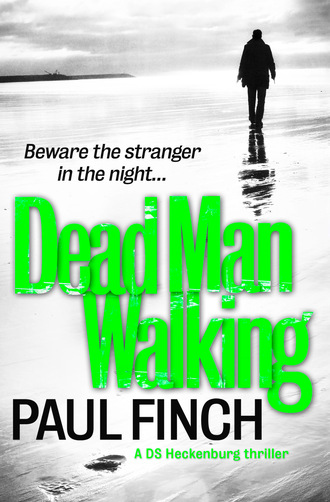
Полная версия
Dead Man Walking
She found the radio and slammed it to her lips as she threw herself forward through the cordite. ‘All units, this is DC Piper! Converge on Halfpenny Reservoir! Repeat, converge on Halfpenny Reservoir …’
Her words tailed off as a stocky figure rose to its feet outside. For a half-second she tried to kid herself that this was Maxwell, though she knew it couldn’t be. The DC’s head had struck the tarmac with a hell of a whack.
Without a word, the figure swayed around and blundered across the car park.
‘Repeat, this is DC Piper! Decoy unit Alpha. One shot fired. Suspect suffering a chest wound, but on foot and mobile.’
There was a scrabble of static-ridden responses, but even as Piper watched, the lumbering form of the Stranger scrambled over the car park’s low perimeter wall, the dark blot of his outline swiftly ascending through the furze on the other side. He was hurt badly; that was clear – he lurched from side to side, but kept going in a more or less straight line, uphill and away from her.
‘Suspect heading west … away from the reservoir, over open ground,’ she added, clattering onto the tarmac in her tall, strappy shoes. ‘We need an ambulance too.’ She dropped to one knee to check the carotid at the side of Maxwell’s neck. ‘DC Maxwell is severely injured … he’s received a massive shock from some kind of stun-gun and what looks like a head trauma. Currently in a collapsed state, but breathing, and his pulse feels regular. Get that ambulance here, pronto! In the meantime, I’m pursuing the suspect, over.’
She hurried across the car park, but once she was over the wall into the furze, her heels sank like knife-blades in the soft earth. She kicked the shoes off as she ran, flinching as twigs and sharp-edged stones spiked the soles of her feet, and thorns and thistles raked her naked legs. Very briefly, the Stranger appeared above her as a lopsided silhouette on the night sky. But then he was gone again, over the ridge.
‘Get me that back-up now!’ she shouted into her radio.
‘Gemma, you need to hold back,’ came a semi-coherent response. ‘DSU Anderson’s orders! Wait for support units, over!’
‘Negative, that!’ she replied firmly. ‘Not when we’re this close.’
She too crested the ridge. The starlit moor unrolled itself: a sweeping georama of grass and boulders, obscured by patches of low-lying mist but rising distantly to soaring, tor-crowned summits. On lower ground now, but a hundred yards ahead of her at least, a dark blot was struggling onward.
The ground sloped steeply as she gave chase, ploughing downhill through soft, springy vegetation, shouting that he was under arrest; that he should give it up.
Perspectives were all askew, of course, so she wasn’t quite sure where she lost sight of him. Though he wasn’t a vast distance ahead, curtains of mist seemed suddenly to close around him. When she reached that point herself – now hobbling, both feet bruised and bleeding – she found she was on much softer ground, plodding through ankle-deep mud. He ought to have left a recognisable trail, but it was too dark to see and she had no light with which to get down and make a fingertip search.
Further terse orders came crackling over the airwaves.
Again, she ignored them. It occurred to her that maybe the suspect was wearing a vest and therefore not as badly injured as she’d thought. But if that was the case, why had he fled … why not use the advantage to go straight on the attack, ripping and mauling her in the car? No – she’d wounded him; she’d seen the pain in his posture. If nothing else, that meant there’d be blood.
Unless rain came before the forensics teams did.
‘We need the lab-rats up here ASAP!’ she shouted, cutting across the frantic exchanges of her colleagues. ‘At least we’ll have his DNA …’
There was a choked scream from somewhere ahead.
She slowed to a near-halt. Fleetingly, she couldn’t see anything; liquid mist, the colour of purulent milk, drifted on all sides. But had that cry been for real? Was he finally succumbing to his wound? Or was he trying to lure her?
There was another scream, this one accompanied by a strangled gurgling.
She now halted completely.
This was Dartmoor. A National Park. A green and hazy paradise. Picturesque, famous for its pristine flora and fauna. And notorious for its bottomless mires. The third scream dwindled to a series of choked gasps, and now she heard a loud sploshing too, like a heavy body plunging through slime.
‘Update,’ she said into her radio, advancing warily. ‘I’m perhaps three hundred yards west of the reservoir parking area, over the top of the ridge. Suspect appears to be in trouble. I can’t see him, but it’s possible he’s blundered into a mire.’
There was further insistence that she stop and wait for back-up. Again she ignored this, but only advanced five or six yards before she found herself teetering on the brink of an opaque, black/green morass, its mirror-flat surface stretching in all directions as the mist seemed to furl away across it. She strained her eyes, but nothing stirred out there; not so much as a ripple, let alone the distinctive outline of a man fighting to keep his head above the surface.
There was no sound either, which was worrying. Dartmoor’s mires could suck you down with frightful speed. Their bowels were stuffed with sheep and pony carcasses, not to mention the odd missing hiker or two. But all she could identify now were the twisted husks of sunken trees, their branches protruding here and there like rotted dinosaur bones.
Even Detective Constable Gemma Piper, of the Metropolitan Police – wilful, fearless and determined – now realised that caution was the better part of valour. Especially as the mist continued to clear on the strengthening wind, revealing, despite the darkness of night, how truly extensive this mire was. It lay everywhere; not just ahead of her but on both sides as well – as though she’d strayed out onto a narrow headland. It was difficult to imagine that even a local man could have lumbered this way, mortally wounded, blinded by vapour, and had somehow avoided this pitfall. And if nothing else, she now knew their suspect was not a local man – but, by origin at least, from the other end of the country.
As voices sounded behind her, torches spearing across the undulating landscape, she sank slowly and tiredly to her haunches. The delayed shock of what had nearly happened back in the Porsche was seeping through her, leaving her numb. In some ways she felt elated; she’d almost nailed the bastard … but not quite. It was like a no-score draw after a football match. It was a result of sorts, but it was difficult to estimate how much of one.
Within an hour, the Devon and Cornwall Police, with assistance from Scotland Yard, had cordoned off this entire stretch of moor, were searching it with dogs, and had even brought heavy machinery in to start dredging the mire and its various connected waterways. At the reservoir car park, the conscious but weakened form of DC Maxwell was loaded into the rear of an ambulance. Gemma Piper meanwhile sat side-saddle in the front seat of a police patrol car, sipping coffee and occasionally wincing as a medic knelt and attended to her bloodied feet and swollen face. At the same time, she briefed Detective Superintendent George Anderson.
The hard-headed young female detective, already impressive to every senior manager who’d encountered her, had just assured herself a glowing future in this most challenging and male-dominated of industries. But of the so-called Stranger, the perpetrator of thirteen loathsome torture-murders – as reported in the Dartmoor Advertiser: ‘These crimes are abhorrent, utterly loathsome!’ – there was no trace.
Nor would there be for some considerable time.
Chapter 1
Present Day
There was no real witchcraft associated with this part of the Lake District. Nor had there ever been, to Heck’s knowledge.
The name ‘Witch Cradle Tarn’ had been applied in times past purely to reflect the small mountain lake’s ominous appearance: a long, narrow, very deep body of water high in the Langdale Pikes, thirteen hundred feet above sea-level to be precise, with sheer, scree-covered cliffs on its eastern shore and mighty, wind-riven fells like Pavey Ark, Harrison Stickle and Great Castle Howe lowering to its north, west and south. It wasn’t an especially scary place in modern times. Located in a hanging valley in a relatively remote spot – official title Cragwood Vale, unofficial title ‘the Cradle’ – it was a fearsome prospect on paper, but when you actually got there, the atmosphere was more holiday than horror. Two cheery Lakeland hamlets, Cragwood Keld and Cragwood Ho, occupied its southern and northern points respectively. For much of the year the whole place teemed with climbers, hikers, fell-runners and anglers seeking the famous Witch Cradle trout, while kayakers and white-water rafters were catered for by the Cragwood Boat Club, based a mile south of Cragwood Keld, near the head of Cragwood Race; a furiously twisting river, which poured downhill through natural gullies and steep culverts before finally joining the more sedately flowing Langdale Beck.
The single pub at the heart of Cragwood Keld only added to this homely feel. A rather austere-looking building at first glance, all grey Westmorland slate on the outside, it was famous for its smoky beams and handsome oak settles, its range of cask ales, its crackling fires in winter and its pretty lakeside beer garden in summer. Its name – The Witch’s Kettle – owed itself entirely to some enterprising landlord of decades past, who hadn’t found The Drovers’ Rest to his taste, and felt the witch business a tad sexier, especially given that most visitors to the Cradle were always awe-stricken by the deep pinewoods hemming its two villages to the lakeshore, and the rubble-clad slopes and immense granite crags soaring overhead. Its inn-sign was a landmark in itself, depicting a rusty old kettle with green herbs protruding from under its lid, sitting on a stone inscribed with pagan runes. It was just possible, visitors supposed, that current landlady, Hazel Carter, might herself be a witch – but if so, she was a far cry from the bent nose and warty lip variety.
At least, that was Heck’s feeling.
He’d only been up here two and a half months, but was already certain that whatever magic Hazel wove, it was unlikely to be the sort he’d resist easily. Not that he was thinking along these lines that late November morning, as he entered The Witch’s Kettle just before eleven, made a beeline for the bar and ordered himself a pint of Buttermere Gold. It was early in the day and there were few customers yet. Only Hazel was on duty. Like Heck, she was in her late thirties, but with rich auburn hair, which she habitually wore very long. She was doe-eyed, soft-lipped, and buxom in shape, a figure enhanced by her daytime ‘uniform’ of t-shirt, cardigan and jeans.
They made close eye-contact but only uttered those words necessary for the transaction. However, as she handed him his pint and his change, the landlady inclined her head slightly to the right. Heck pocketed the cash and sipped his beer, before glancing in that direction. Beyond a low arch lay the pub’s vault, which contained a darts board and a pool table. One person was in there: a young lad, no more than sixteen, with tousled blond hair, wearing a grey sweatshirt, grey canvas trousers and white trainers. He looked once, fleetingly, in Heck’s direction as he worked his way around the pool table, ignoring him thereafter. All the youth had seen, of course, was a man about six feet in height, of average build, with unruly black hair and faint scars on his face, wearing jeans, a sweater and a rumpled anorak. But he’d probably have paid more attention had he known that Heck was actually Detective Sergeant Mark Heckenburg of the Cumbria Constabulary, that he was based very near here, at Cragwood Keld police office, and that he was on duty right at this moment.
To maintain his façade of recreation, Heck found a seat at an empty table, pulled a rolled-up Westmorland Gazette from his back pocket and commenced reading. He checked his watch as he turned the pages, though this was more from habit than necessity. He felt he was following a good lead today, but there was no great pressure on him. Ever since being reassigned from Scotland Yard to Cumbria as part of the Association of Chief Police Officers’ new Anti-Rural Crime Initiative, Heck had been well-placed to work hours of his own choosing and at his own pace. Ultimately of course, he was answerable to South Cumbria Crime Command, and in the first instance to the CID office down at Windermere police station; he was only a sergeant, when all was said and done. But as the only CID officer in the Langdales – the only CID officer in twenty square miles in fact – he was out here on his own as far as many colleagues were concerned: ‘Hey pal, you’re the man on the spot,’ as they’d say. There were advantages to this, without doubt. But it was never a nice feeling that reinforcements were always a good forty minutes away.
Heck’s thoughts were distracted as two other people came down the stairs into the taproom. It was a man and a woman, the former in his mid-thirties, the latter in her mid-twenties, both carrying bulging backpacks. The woman had short, mouse-brown hair, and wore a red cagoule, blue cord trousers and walking boots. The man was tall and thin, with short fair hair. He too wore cord trousers and walking boots, but his blue cagoule was draped over his narrow, t-shirted shoulders. Neither of them looked threatening or in any way unwholesome; in fact they were smiling and chattering brightly. At the foot of the stair, they separated, the man heading to the bar, where he told Hazel he’d like to ‘settle up’. The woman turned into the vault and spoke to the youth, who pocketed his last ball and grabbed up a backpack of his own.
The trio left the pub together, still talking animatedly – a family enjoying their holiday. As the door swung closed behind them, Heck glanced over the top of his newspaper at Hazel, who nodded. Leaping to his feet, he crossed the room to the car park window, and watched as the trio approached a metallic-green Hyundai Accent. He’d been informed by Hazel beforehand that this was the vehicle they’d arrived in two weeks ago, and had already run a check on the Police National Computer, to discover that its registration number – V513 HNV – actually belonged to a black Volvo estate supposedly sold to a scrap merchant in Grimsby nine months earlier. Without a backward glance, they piled into the Hyundai and pulled out of the car park, heading south out of the village.
Heck hurried outside – it was only noon, but it was a grey day and there was already a deep chill. Thanks to the season, the village was quieter than usual. Beyond the pines, the upward-sweeping moors were bare, brown and stubbled with autumn bracken.
Heck climbed into his white Citroën DS4, starting the engine and hitting the heater switch, but resisted the temptation to jump straight onto the suspects’ tail. At this time of year, with traffic more scarce than usual, it would be easy to get spotted. Besides, there was only one way you could enter or leave the Cradle – via the aptly named Cragwood Road, a perilously narrow single-lane which wound downhill over steep, rock-strewn slopes for several hundred feet, sometimes tilting to a gradient of one in three – so it wasn’t like the suspects could turn off anywhere, or even drive away at high speed. Of course, once the trio had descended into Great Langdale, the vast glacial valley at the epicentre of this district, it was another matter. So Heck couldn’t afford to hang back too far.
As such, he gave them a thirty-second start.
It was about three miles from the village to the commencement of the descent, and Heck didn’t see a single soul as he traversed it, nor another car, which was comforting – though it was useful to be able to hide among normal vehicles, an open road was reassuring in the event you might need to chase. As he began his descent, he initially couldn’t see his target, but he refused to panic. The blacktop meandered wildly on its downward route, arcing around perilous bends and through clumps of shadowy pine. But when he finally did sight the Hyundai, it had got further ahead than he’d expected. It was diminutive; no more than a glinting green toy.
Heck accelerated, veering dangerously as the road dropped, taking curves with increasingly reckless abandon. He tried his radio, but received only dead-air responses. There was minimal reception in the Cradle, the encompassing cliffs interfering so drastically with signals that most communications from Cragwood Keld nick had to be made via landline. But it would improve as he descended into Langdale. In anticipation of this, he was already tuned to a talk-through channel.
‘Heckenburg to 1416, over?’ he repeated.
He’d descended to six hundred feet before he gleaned a response.
‘1416 receiving. Go ahead, sarge.’ The voice was shrill, with an Irish brogue.
‘Suspects on the move, M-E … heading down Cragwood Road towards the B5343. Where are you, over?’
M-E, or PC 1416 Mary-Ellen O’Rourke, Cragwood Keld nick’s only uniformed officer – she was actually resident there, bunking in the flat above the office – took a second or two to respond. ‘Heading up Little Langdale from Skelwith Bridge, sarge. They still in that green Hyundai, over?’
‘Affirmative. Still showing the dodgy VRM. I’ll give you a shout soon as I know which way they’re headed, over?’
‘Roger that.’
As Heck now descended towards the junction with the B5343, he had a clear vision both west and east along Great Langdale. This was a vastly more expansive valley than Cragwood Vale, its head encircled by some of Cumbria’s most impressive fells; not just the craggy-topped Langdale Pikes, but Great Knott, Crinkle Crags, Bowfell and Long Top – their barren upper reaches ascending to dizzying heights. By contrast, its floor was flat and fertile, and perhaps half a mile across, much of it divided by dry-stone walls and given to cattle grazing. Down its centre, in a west to east direction, flowed Langdale Beck, a broad, rocky river, normally shallow but running deep at present after a spectacularly soggy October and November. A hundred yards ahead meanwhile, at the end of Cragwood Road, the Hyundai passed onto the B5343 without stopping, following the larger route as it swung sharply south, crossing the river by a narrow bridge. Still hoping to avoid detection, Heck dallied at the junction, watching the Hyundai shrink as it ascended the higher ground on the far side.
‘Heckenburg to 1416?’
‘Receiving, sarge … go ahead.’
‘Suspect vehicle heading south along the upper section of the B5343.’ He glanced at his sat-nav. ‘That means they’re coming your way, M-E.’
‘Affirmative, sarge. I’m headed in that direction now. You want me to intercept?’
‘Negative … we haven’t got enough on them yet.’
There was only one patrol vehicle attached permanently to Cragwood Keld police station: the powerful Land Rover Mary-Ellen was currently driving. Decked in vivid yellow-and-turquoise Battenburg, it was purposely designed to be noticeable on these bleak uplands; it even had a special insignia on its roof so air support could home in on it – but that was less useful on occasions like this, with stealth the order of the day.
‘M-E … proceed to Little Langdale village, and park up,’ Heck said. ‘That way, if they reach your position and we still don’t want to pull them, you can get out of sight.’
‘Wilco,’ she replied.
Heck hit the gas as he accelerated onto the B5343 and followed it across the valley bottom, taking the bridge over the beck. The Hyundai was still in sight, but high up now and far away; a green matchbox car. Shortly, it would dwindle from view altogether. Heck floored the pedal, the dry-stone walls enclosing the paddocks falling behind, to be replaced by swathes of tough, tussocky grass, which sloped steeply upward ahead of him. The fleecy white/grey blobs of Herdwick sheep were dotted all over the valley’s eastern sides, several wandering across the road as he accelerated, scattering and bleating in response. Officially, the B5343 no longer bore that title at this point – it was now significantly less than a B-road, but it never rose as high as Cragwood Road, and in fact levelled out at around seven hundred feet. Once again, it banked and swung, though Heck kept his foot down, managing to close the distance between himself and the Hyundai to about four hundred yards.
The ground on the right had now dropped away into a deep, tree-filled ravine, through the middle of which a smaller beck tumbled noisily, draining excess water from Blea Tarn, the next lake on this route, located about five miles ahead. Before that, approaching on the right, there was another pub, The Three Ravens. In appearance, this was more like a Lakeland cottage, low and squat, built from whitewashed stone. Despite its dramatic perch on the very edge of the ravine, a small car park was attached to one side of it, though only one vehicle was visible there at present: a maroon BMW Coupe.
Heck glanced at his watch – it was lunchtime. This was the time of day the bastards usually pounced. His gaze flitted back to the Hyundai, the tail-lights of which glowed red, its indicator flashing as it veered right into The Three Ravens car park, pulling up almost flush against the pub wall.
Heck smiled to himself. They’d sussed this spot out previously, and knew where the outdoor CCTV was unlikely to catch them.
‘Heckenburg to 1416, over?’
The response was semi-audible owing to the higher ground, filtered through noisy static. ‘Go ahead, sarge.’
‘We’re on, M-E. Suspects have called at The Three Ravens pub, overlooking Blea Tarn ghyll. If I’m right, they’re going to hit their next target somewhere between here and the tarn. It’s perfect for them. Five miles of the remotest stretch of road in the Langdales. In fact, I think it’s a must-hit. They won’t want to chance it after that … too many cottages.’
‘Received, sarge. How do you want to play it, over?’
‘Bring your Land Rover up the B5343. Wait on Blea Tarn car park. But tuck yourself out of the way in case they carry on past, over.’
‘Roger, received.’
Heck proceeded past The Three Ravens car park, catching sight of the lad from the Hyundai loitering about, now with his sweatshirt hood drawn up, while the two adults entered the pub, no doubt to size up any potential opposition. Mindful of indoor CCTV, the girl had affected a blonde, shoulder-length wig, while the man had donned a woolly hat with what looked like ginger hair extensions around its rim. Heck could have laughed out loud, except that unsophisticated precautions like these often hugely aided criminals. Though not on this occasion, if he could just get his timings right. Feeling that old tingle of excitement – something in distinct short supply these last two and a half months – he scanned the roadside verges for a lying-up point. A couple of hundred yards further on, he spied a break in the dry-stone wall on his left, a farm track leading through it and dropping out of sight into a hollow. Heck swung through and swerved down the stony lane, only halting among a thicket of alder, where he threw his Citroën into reverse, made a three-point turn and edged back uphill, halting some forty yards short of the gate. Jumping out, he climbed the rest of the track on foot, dropping to a crouch behind the right-hand gatepost and watching the road.
He wasn’t sure how long this thing would take. If his suppositions were correct, the first thing this crew would do was establish whether or not their potential target was likely to be easy: an elderly couple or someone travelling alone would be preferable. Under normal circumstances they’d then ascertain which car in the car park belonged to said party. This was more simply done than the average member of the public might imagine, especially at a time of year when there were fewer cars to choose from. Maps and luggage, for example, would indicate visitors rather than locals; an absence of toys would suggest older travellers, which in its turn might be confirmed by evidence of medication or a choice of music or reading material – it was amazing what you could learn from the books and CDs that routinely littered footwells. In this case of course it would be even easier than usual – there was only one car. After that, it was a straightforward matter of disabling the car in question – previously this had been done by inflicting small punctures on the tyres with an air pistol – and following until it pulled up by the roadside.







